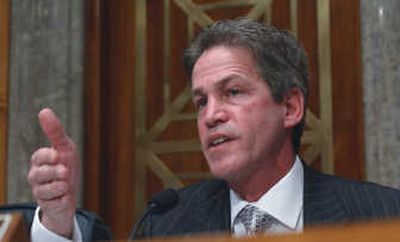Easy way to get dirty bomb

WASHINGTON – Undercover investigators posing as corporate bosses got a Nuclear Regulatory Commission license to buy radiological material that could be used in a so-called dirty bomb, according to a government report released Wednesday.
Senators and Government Accountability Office investigators say their nine-month probe of NRC licensing practices revealed loopholes that could give terrorists easy access to cesium-137 and other dangerous materials that could be used to make radioactive bombs.
Since the 9/11 attacks, intelligence and security officials, including Homeland Security Secretary Michael Chertoff, have warned that terrorists could set off “dirty bombs” in U.S. cities. Although a radiological bomb would not kill many people, officials say it could threaten long-term health, wreak psychological havoc and cost millions in cleanup of contaminated neighborhoods.
“The sad reality is if al-Qaida had simply set up a phony corporation, it could have gone to the NRC and gotten all the radiological material they needed,” said Sen. Norm Coleman, R-Minn, the top Republican on the Senate’s Permanent Subcommittee on Investigations.
For government investigators, “it was as easy to get these licenses as it is to get a DVD at Netflix.”
The NRC said Wednesday that it has already changed its licensing requirements in response to the report, which will be released at a Senate hearing today.
Commissioner Edward McGaffigan said that when investigators informed the NRC of their findings in June, the agency suspended licensing procedures for two weeks and put tougher rules into effect. Among them: requiring NRC officials to either visit a company requesting a license or interview its executives in person.
Not requiring site visits and in-person interviews “was a mistake that we fixed,” McGaffigan said. But he said the NRC “can’t work on everything at once” when it comes to securing nuclear facilities and radiological materials.
Investigators filled out applications using fake names for a bogus company’s president and radiation safety officer. They claimed the company wanted to buy portable moisture-density gauges commonly used at construction sites. The gauges contain sealed gamma-emitting radiation sources, such as cesium-137, and sealed neutron sources, both of which can be used to make dirty bombs.
The application to the NRC was approved in just 28 days, with no request for a site visit and no checks to determine whether the applicants were even real people, Coleman said. The application was approved and the license sent to a Mail Boxes, Etc., drop box.
Investigators then were able to alter the license to allow the “company” to buy many more gauges than approved and signed contracts with suppliers to buy gauges containing enough radiological material to build a dirty bomb.
The GAO said nothing would have stopped it from buying even more, possibly enough to build many bombs.
McGaffigan said the NRC plans to build a Web-based licensing system that would help eliminate counterfeiting and altering of documents. But it won’t be online until 2009, at the earliest, he said.
Coleman said the NRC’s new policy on interviews isn’t good enough because it allows some companies to avoid an on-site visit. But McGaffigan said on-site visits are “impractical” in large states.